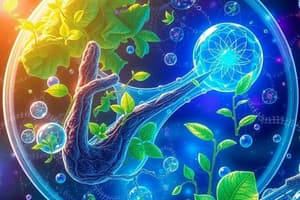Podcast
Questions and Answers
What is the primary focus of botany?
What is the primary focus of botany?
- Study of animals
- Study of plants (correct)
- Study of microorganisms
- Study of heredity and variation
Which statement about cell theory is correct?
Which statement about cell theory is correct?
- All cells are identical in structure and function
- Cells arise spontaneously from non-cellular matter
- Cells can live independently outside organisms
- All living organisms are composed of cells (correct)
What is produced during cellular respiration?
What is produced during cellular respiration?
- Glucose
- Oxygen
- Carbon dioxide
- ATP (correct)
What does natural selection explain?
What does natural selection explain?
What is an ecosystem?
What is an ecosystem?
Which biological process maintains stable internal conditions in an organism?
Which biological process maintains stable internal conditions in an organism?
What is the purpose of CRISPR technology?
What is the purpose of CRISPR technology?
Which process results in offspring with genetic variation?
Which process results in offspring with genetic variation?
Flashcards are hidden until you start studying
Study Notes
Overview of Biology
- Definition: Biology is the scientific study of life and living organisms.
- Branches:
- Botany: Study of plants.
- Zoology: Study of animals.
- Microbiology: Study of microorganisms.
- Genetics: Study of heredity and variation.
- Ecology: Study of interactions between organisms and their environment.
Cell Theory
- All living organisms are composed of cells.
- Cells are the basic unit of life.
- All cells arise from pre-existing cells.
Basic Biological Processes
- Photosynthesis: Process by which green plants convert light energy into chemical energy (glucose) using sunlight, carbon dioxide, and water.
- Cellular Respiration: Process of breaking down glucose to produce energy (ATP) in the presence of oxygen.
- Reproduction:
- Asexual: Offspring genetically identical to one parent.
- Sexual: Offspring with genetic variation from two parents.
Genetics and Evolution
- DNA Structure: Double helix composed of nucleotides (adenine, thymine, cytosine, guanine).
- Genes: Units of heredity; segments of DNA that code for proteins.
- Natural Selection: Mechanism of evolution where organisms better adapted to their environment tend to survive and reproduce.
Ecology
- Ecosystems: Community of living organisms interacting with their physical environment.
- Biodiversity: Variety of life in the world; important for ecological balance.
- Food Chains/Webs: Illustrate energy flow in ecosystems through producers, consumers, and decomposers.
Human Biology
- Systems Overview:
- Circulatory: Transports blood and nutrients.
- Respiratory: Facilitates gas exchange (O2 and CO2).
- Digestive: Breaks down food for nutrient absorption.
- Nervous: Controls body functions and responses to stimuli.
Key Concepts
- Homeostasis: Maintenance of stable internal conditions in an organism.
- Evolution: Change in heritable traits of biological populations over successive generations.
- Cell Division: Includes mitosis (cell division for growth/repair) and meiosis (reduction division for gametes).
Important Theories
- Endosymbiotic Theory: Explains the origin of eukaryotic cells from prokaryotic organisms.
- Germ Theory of Disease: States that many diseases are caused by microorganisms.
Current Trends in Biology
- CRISPR Technology: Gene editing tool that allows for precise alterations in DNA.
- Synthetic Biology: Engineering organisms for useful purposes by designing and constructing new biological parts.
Conclusion
- Biology is a vast field with numerous applications in health, environmental science, and biotechnology.
- Continual research and advancements drive our understanding of life processes and their complexities.
Overview of Biology
- Biology is the scientific study of life and living organisms.
- It encompasses various branches, including Botany, Zoology, Microbiology, Genetics, and Ecology.
Cell Theory
- All living organisms are composed of cells.
- Cells are the fundamental unit of life.
- All cells arise from pre-existing cells.
Basic Biological Processes
- Photosynthesis is the process where green plants transform light energy into chemical energy (glucose) using sunlight, carbon dioxide, and water.
- Cellular Respiration breaks down glucose to produce energy (ATP) in the presence of oxygen.
- Reproduction can be either asexual, where offspring are genetically identical to one parent, or sexual, where offspring inherit genetic variation from two parents.
Genetics and Evolution
- DNA, the molecule of heredity, is structured as a double helix composed of nucleotides (adenine, thymine, cytosine, and guanine).
- Genes are segments of DNA that code for proteins, representing units of heredity.
- Natural selection is a driving force of evolution, where organisms best adapted to their environment tend to survive and reproduce more successfully.
Ecology
- Ecosystems encompass a community of living organisms interacting with their physical environment.
- Biodiversity, or the variety of life on Earth, is crucial for maintaining ecological balance.
- Food chains and webs illustrate the flow of energy through ecosystems, involving producers, consumers, and decomposers.
Human Biology
- The human body is composed of various systems, including the circulatory system for blood and nutrient transportation, the respiratory system for gas exchange, the digestive system for food breakdown and absorption, and the nervous system for controlling bodily functions and responses to stimuli.
Key Concepts
- Homeostasis refers to the maintenance of stable internal conditions within an organism.
- Evolution describes the change in heritable traits of biological populations over successive generations.
- Cell division encompasses mitosis, responsible for cell growth and repair, and meiosis, a reduction division process that generates gametes (sex cells).
Important Theories
- The Endosymbiotic Theory proposes that eukaryotic cells originated from prokaryotic organisms.
- The Germ Theory of Disease asserts that many diseases are caused by microorganisms.
Current Trends in Biology
- CRISPR technology enables precise alterations in DNA sequences, revolutionizing gene editing.
- Synthetic biology involves engineering organisms for useful purposes by designing and constructing novel biological parts.
Conclusion
- Biology is a vast and dynamic field with applications in health, environmental science, and biotechnology.
- Ongoing research and advancements continue to deepen our understanding of life processes and their complexities.
Studying That Suits You
Use AI to generate personalized quizzes and flashcards to suit your learning preferences.




